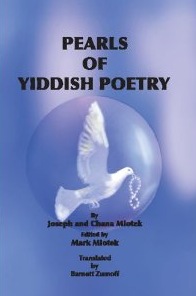|
 |
| |
Perl fun der Yiddisher Poezie
How the book Perl fun der Yiddisher Poezie, first published in Yiddish in 1973 and published in English in 2010,
was born
In the summer of 1970, shortly after I became the editor
of the Forverts, Joseph Mlotek, then
the Educational Director of the Workmen’s Circle, proposed to me that we introduce a poetry contest
in the paper. He knew how eager I was to bring in new and interesting features, so he told me about the
plan he had conceived, a plan that would be doubly useful: it would arouse the interest of the
readers in the treasure of Yiddish poetry and it
would draw the readers themselves into participating in it. I had good reason to have serious doubts about the prospects for success. At that time I was reprinting
works from the older Yiddish literature in the Forverts, and the response
of the readers was very weak. If the classical prose creations hadn’t evoked any great interest, what could
I expect from poetry? Nevertheless I decided to try. What did I have to lose? If there wasn’t a
good response, we would discontinue it after a few weeks and no one would miss it. In the Notes From The Editor in the middle
of a week, I announced the new section, which appeared for the first
time in the Forverts of October 25,
1970, under the rubric Perl Fun Der
Yidisher Poezie—Ver Hot Zey Geshafn? fun A. Forsher (Pearls of Yiddish
Poetry—Who Created Them? by A.
Researcher.) In the present book, it is revealed for the first time that A. Researcher
was Joseph Mlotek and his
wife, Chana Mlotek, who is a well known researcher of Yiddish folksongs. That rubric
was the start of this book. The morning after the first poetry contest appeared, I encountered a Yiddish
writer near the Forverts building, and
he saluted me for the new initiative. He would want it to
be successful, he said, but he wanted to warn me that I shouldn’t expect any response from the readers.
When I got to the editorial office, there were 15 letters on my desk that were addressed to A. Researcher. That was the
first indication that the new feature was a “hit.” 
How much of a hit it was we first began to comprehend in the succeeding days, when packs of
letters kept arriving, both from New York and from the rest of the country and Canada. Later we also
began getting letters from overseas. This foreword, by the then editor of the Forverts, introduced
the original book in Yiddish.
And the interest
continues to the present time when these lines are being written (December 1972),
more than two years after the first rubric of Pearls appeared in the Forverts. The success
has been truly phenomenal. After a few months, it became apparent
that the section had achieved much more than the goals that those in charge of the poetry contest
and the Forverts Editor had set. In
addition to rediscovering the great treasure of Yiddish poetry, the section had uncovered a true folk treasure
that would have been lost forever, namely the poems that readers remembered. We had tapped the sources
of a mass of Yiddish folksongs and their various versions, had established who the authors were of a number
of songs that had previously been thought to be anonymous folksongs, and had discovered the composers of
a number of songs whose music had previously been nearly unknown.
For such work as the two researchers
Joseph and Chana Mlotek have done, people all over the world get doctorates and other kinds of recognition.
We do not have such measures at our disposal. Therefore we have taken the initiative of seeing to it
that these great findings should not go lost again (a newspaper, after all, lives no longer than 24 hours.)
On May 27, 1971, I published in the
Forverts a personal appeal
to the readers to help us perpetuate the newly found
treasure between hard covers, by subscribingin advance to the planned book of the Pearls. Many readers
responded immediately with contributions of more than the
price of the book. My heartfelt thanks to all of them. They can also be proud to have been partners
in a great Yiddish cultural undertaking. The book you are now holding in your hand contains a selection
from the materialthat has appeared in the Forverts during the first
18 months of the section’s publication.
Simon Weber
|
|
|